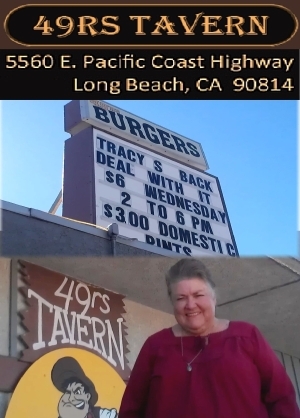(Jan. 27, 2013) -- In his Jan. 15 "State of the City" message and as quoted in a Jan. 25 LBPD release listing LB's citywide (but not neighborhood) 2012 crime statistics, Mayor Bob Foster attributed double-digit increases in property crimes to the state legislature's prison "realignment" [which reduced Sac'to budget costs by sending some categories of state prisoners back to counties where some have returned to the streets].
But Los Angeles also experienced realignment...and burglaries in L.A. decreased from 2011 to 2012...while they increased in Long Beach by double-digits.
Similarly, Grand Theft Auto decreased in Los Angeles...but increased by a double-digit percentage in Long Beach.
- In the City of Los Angeles, from 2011 to 2012 burglaries (not including vehicles) decreased by 6.4% but in Long Beach, burglaries (not including vehicles) increased by 13.7%. [Source: LAPD End of Year 2012 Crime Snapshot, cites "burglary" (without vehicle burglaries), p. 2. City of Long Beach percentage derived from LBPD crime data (released Jan. 25, 2013) using residential + comm'l + garage burglaries without vehicle burglaries]
- In Los Angeles, Grand Theft Auto decreased by 3.2%...but in Long Beach, Grand Theft Auto increased by 18.5%. [Source: LAPD End of Year 2012 Crime Snapshot, p. 2. City of Long Beach LBPD 2012 crime data (released Jan. 25, 2013) Grand Theft Auto category]
Caveat: Statistics cited above are citywide [a metric inherently combining more and less crime impacted parts of both cities]. LAPD and LBPD both acknowledge that their figures are preliminary. Our figures are likewise preliminary in part because the two jurisdictions report some categories of crime in different ways. LAPD has its own category -- "BTFV" -- for "Burglary/Theft From A Vehicle" while LBPD uses the traditional "auto burglary" category and lists two other categories of thefts (grand theft and petty theft). LBREPORT.com is pursuing details of both metrics and we'll update our figures accordingly as they are received.
However, for purposes of a rough initial comparison, from 2011 to 2012 "BTFV"s (burglaries/thefts from a vehicle) in Los Angeles increased 2.2%...while auto burglaries in Long Beach increased at over twice that rate, 5.5%.
In terms of violent crime, murders in Long Beach increased by either 16% or 20% (depending on whether one uses the 25 murders LBPD reported to the FBI or one uses the 26 total when the Coroner's Office subsequently ruled an undetermined death to be a murder).
LBREPORT.com is unaware of data documenting the numer of arrests and convictions of former state prison inmates who've been returned to counties (including L.A. County) under realignment. Until that data surfaces [we presume it will at some point], conclusions about the real effects of realignment necessarily remain inferences.
However contrary to the notion that realignment alone accounts for LB's property crime increase is text in the City of Long Beach's own FY13 LBPD budget (released Aug. 2012). It cites realignment as one factor among others -- including reduced funding for education, mental health programs and Police Department staffing reductions -- in anticipating crime increases in FY13.
For FY 13, the violent crime rate may be negatively impacted as a result of decreases in Federal and State funding available for education and mental health programs due to the economic downturn, a recent Supreme Court ruling for the release of over 30,000 inmates from California prisons to improve health care services for remaining inmates, and Police Department staffing reductions. [Source: LBPD FY13 proposed budget, LBPD narrative text p. 3]
For one of those factors -- police staffing -- L.A. County's two largest cities have pursued diametrically opposed policies.
L.A. Mayor Villaraigosa and an L.A. City Council majority have maintained and built their city's police level while during the same period, Long Beach Mayor Foster and his allied LB Council majority enacted budgets that have let LB's police staffing fall to levels not seen since the mid-1990's.
During Mayor Beverly O'Neill's tenure (1994-2006), Long Beach City Councils gradually [too gradually for some] increased police levels in part using federal grants. In 2006, Mayor Foster campaigned on a pledge to add 100 officers during his first four years in office and on taking office in mid-2006...and LB City Hall proceeded to keep that promise by conducting replenishment police academy classes and filling vacant officer positions,
By early 2008, Long Beach reached its highest officer level ever, but it was still barely 2.0 officers per thousand residents while Los Angeles budgeted roughly 2.4-2.5 officers per thousand residents and Signal Hill budgeted over 3.0.
The arrival of the "great recession" worsened the the impacts of costly contracts with City Hall's major public employee unions (police, fire, non-public safety) recommended by Mayor Foster and approved by Council majorities with raises but without meaningful pension reforms.
As the economy worsened and City Hall revenue fell, Mayor Foster and city management began advocating pension reforms and simultaneously urged the Council to cut City Hall budgets in amounts proportional to their General Fund spending...including police and fire. In addition, from 2009 through 2012, Long Beach conducted no replenishment police academy classes to replace retiring/exiting officers. LB City Hall ceased providing virtually all of the police officer positions that it told Washington, during the Clinton administration, that it needed in order to obtain federal (Congressionally appropriated) "more police" grants.
Through attrition, LB City Hall allowed Long Beach's sworn police level to shrink to its current level of roughly between 1.6-1.7 officers per thousand residents. [The higher figure is only valid if one counts officers contracted to the Port, Airport, LB Transit, LBCC and LBUSD, although they're not paid by the Council-budgeted Gen'l Fund and not available for routine deployment citywide. In 2009, 2010, 2011 and 2012, LBPD's total staffing included roughly 60 contracted officers who were unavailable for routine citywide deployment; the number of contracted officers rose to 73 (13 more Port contracted officers) in FY13.]
During the same period, and despite the "Great Recession," Los Angeles City Hall maintained its budgeted citywide police level and as of Jan. 1, 2013 has slightly increased it. It's now at roughly 2.6 officers per thousand residents.
[Population source used in deriving police staffing ratios is 2012 Estimate for CA Cities by CA Dept. of Finance, Report E-1].
For Los Angeles to experience the per capita police level that Long Beach now provides, it would have to cut over 30% of LAPD's budgeted police officers (over 3,000 out of 10,000 officers).
For Long Beach to reach the per capita police level that Los Angeles now provides, Long Beach would have to increase its current citywide (not contracted) police level by roughly 60% (an increase of roughly 450 police officers).
In Sept. 2012, the Long Beach City Council included funding for a replenishment police academy class sometime in FY13. At last report, the six month replenishment police academy class was expected to begin in roughly mid-2013. If so, it won't graduate replenishment officers until late 2013 approaching 2014...by which time additional officers will be lost due to attrition.













